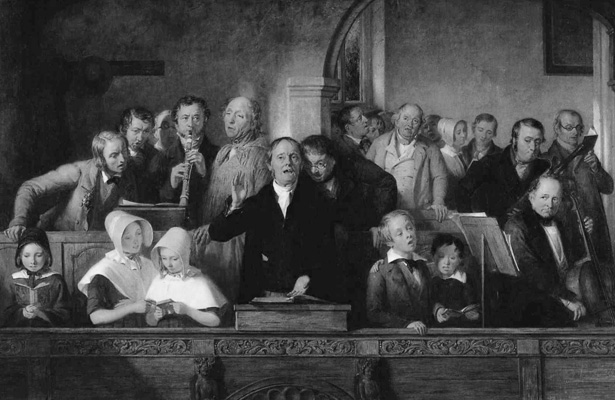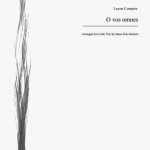
Perhaps your Thanksgiving doesn’t look quite like the festivities of the above painting, but that doesn’t mean you can’t enjoy a nice side of Renaissance music arranged for cello ensemble with your turkey!
Hans Erik Deckert has selected two composers of the Renaissance era representing two generations of the Franco-Flemish school: Loyset Compère and Orlando di Lasso. Both embodied the style of polyphonic vocal music composition which the school was known so well for. Over 500 years later, their music is now available in the form of two fantastic cello ensemble arrangements for download exclusively at Ovation Press.
About Compère's O vos omnes for Cello Trio
Loyset Compère was one of the most prominent composers of the motet-chanson, a specialized musical form of the Renaissance era which usually consisted of two upper voices singing a secular text and a lower tenor voice singing a sacred text. O vos omnes (Cello Trio) is a motet-chanson that is over half a millennium old. Deckert notes that the simplicity of its construction creates an atmosphere of unprecedented devotion, with a vibrant rhythmic element that holds the musical flow together. Cellists who study this piece should be subtle in their use of dynamics, sensitively following the changing intensity of the continuous vocal dialogue.
About Lasso's O la, o che bon eccho! for Cello Octet
Orlando di Lasso's O la, o che bon eccho! (Cello Octet) is a cheerful arrangement based on a madrigal written for an a cappella choir. Deckert divides the octet into two four-part groups. One group repeatedly plays melodies in very short phrases which are promptly answered in the second group half a measure later, creating an echo effect via canon. Deckert recommends at least two cellos on each voice in the first group and one cello on each voice in the echo group. A creative way to maximize the echo effect is to have the echo group perform offstage or in a neighboring room.
About the Editor – Hans Erik Deckert
Hans Erik Deckert was born and grew up in Germany. The son of German and Danish parents, he moved to Denmark shortly after the war in order to study cello and conducting in Copenhagen. Deckert has had a passionate and prolific career in these fields, as well as in chamber music. His roots in the German musical tradition have given him a depth of musicianship much in demand at solo and chamber masterclasses and seminars, which is mixed with a concern for the wider social responsibility of music, stemming from his Scandinavian environment.
For Ovation Press, Deckert has employed this musicianship in a wide number of arrangements of varying styles: including Bach's Four Canons from The Art of Fugue, Rachmaninoff's Vocalise, Saint-Saëns' The Swan, and much more.
Presently Hans Erik Deckert is Honorary President of the Danish section of ESTA (which he also founded in 1978) and resident conductor with the Cello Academy (which embraces a professional 12-part cello ensemble as well as regular training courses for students). He also holds a visiting post at the Freie Musikschule in Hamburg.
Learn more about Hans Erik Deckert and his arrangements at Ovation Press.
All of these scores are available for download exclusively at Ovation Press. If you want to be kept updated on the latest scores from Ovation Press, be sure to join our mailing list!
















‘We’re hoping for a true Bollywood experience,’ says Jain, conjuring visions of
the big Bollywood movie song-and-dance production numbers.
My solution is to soften at the source of illumination, and let the image be as clear as possible.
The previews are shown in order to evoke curiosity in people.
Compas, creo que os habéis equivocado. El ataque fue contra una asociación de madereros, de empresarias y empresarios que se lucran con la tala y proceso de la madera para sus fines. Con #80;madereros&22221; no hacÃa referencia a “maderos” y por lo tanto, tampoco a la policÃa.Salud